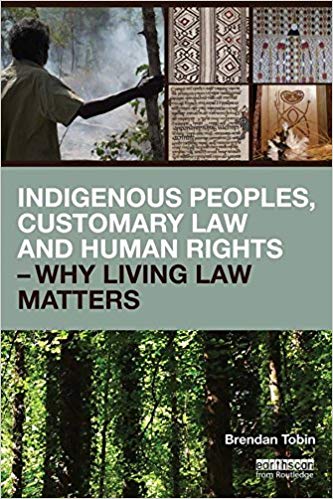This highly original work demonstrates the fundamental role of customary law for the realization of Indigenous peoples’ human rights and for sound national and international legal governance. The book reviews the legal status of customary law and its relationship with positive and natural law from the time of Plato up to the present. It examines its growing recognition in constitutional and international law and its dependence on and at times strained relationship with human rights law.
The author analyzes the role of customary law in tribal, national and international governance of Indigenous peoples’ lands, resources and cultural heritage. He explores the challenges and opportunities for its recognition by courts and alternative dispute resolution mechanisms, including issues of proof of law and conflicts between customary practices and human rights. He throws light on the richness inherent in legal diversity and key principles of customary law and their influence in legal practice and on emerging notions of intercultural equity and justice. He concludes that Indigenous peoples’ rights to their customary legal regimes and states’ obligations to respect and recognize customary law, in order to secure their human rights, are principles of international customary law, and as such binding on all states.
At a time when the self-determination, land, resources and cultural heritage of Indigenous peoples are increasingly under threat, this accessible book presents the key issues for both legal and non-legal scholars, practitioners, students of human rights and environmental justice, and Indigenous peoples themselves.
چکیده فارسی
این اثر بسیار بدیع، نقش اساسی حقوق عرفی را برای تحقق حقوق بشر مردم بومی و برای حاکمیت قانونی ملی و بینالمللی صحیح نشان میدهد. این کتاب به بررسی جایگاه حقوقی حقوق عرفی و رابطه آن با حقوق اثباتی و طبیعی از زمان افلاطون تا کنون می پردازد. این به رسمیت شناختن فزاینده آن در قانون اساسی و حقوق بین الملل و وابستگی آن به قوانین حقوق بشر و گاهی اوقات روابط تیره شده با آن را بررسی می کند.
نویسنده نقش قوانین عرفی را در حکومت قبیله ای، ملی و بین المللی بر سرزمین ها، منابع و میراث فرهنگی مردم بومی تحلیل می کند. او چالشها و فرصتها را برای به رسمیت شناختن آن توسط دادگاهها و مکانیسمهای حل اختلاف جایگزین، از جمله مسائل اثبات قانون و تضاد بین رویههای عرفی و حقوق بشر، بررسی میکند. او به غنای ذاتی تنوع حقوقی و اصول کلیدی حقوق عرفی و تأثیر آنها در رویه حقوقی و مفاهیم نوظهور برابری و عدالت بین فرهنگی اشاره می کند. او نتیجه میگیرد که حقوق مردم بومی در قبال رژیمهای حقوقی عرفی خود و تعهدات دولتها برای احترام و به رسمیت شناختن قوانین عرفی، به منظور تأمین حقوق انسانیشان، از اصول حقوق عرفی بینالمللی است و به این ترتیب برای همه دولتها الزامآور است.
در زمانی که خودمختاری، زمین، منابع و میراث فرهنگی مردم بومی به طور فزایندهای در معرض تهدید قرار میگیرند، این کتاب در دسترس مسائل کلیدی را برای دانشمندان حقوقی و غیرحقوقی، شاغلین، دانشجویان حقوق بشر و محیطزیست ارائه میکند. عدالت، و خود مردمان بومی.
ادامه ...
بستن ...
Ebook details:
عنوان: Indigenous Peoples, Customary Law and Human Rights - Why Living Law Matters
نویسنده: Brendan Tobin
ناشر: Routledge; 1 edition (April 23, 2016)
زبان: English
شابک: 1138671711, 978-1138671713
حجم: 6 Mb
فرمت: True Pdf
ادامه ...
بستن ...










